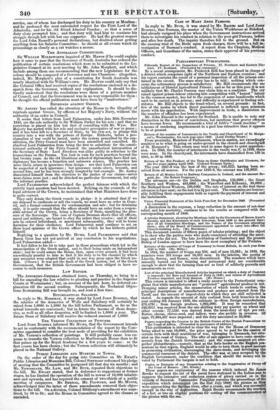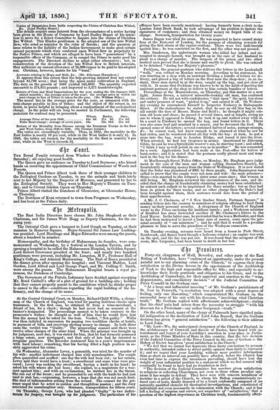PARLIAMENTARY PUBLICATIONS.
Fifteenth Report of the Inspectors of Prisons. II. Northern and Eastern Dis- trict. IV. Scotland. (Presented by command.)
By a recent arrangement, Mr. Frederick nil 1 has been placed in charge of a district which comprises eight of the Northern and Eastern counties; and his report contains the result of a personal inspection of all the prisons con- tained in the circuit. The same story has to be told : nothing which con- cerns the reformatory process is satisfactory. Mr. Hill recommends the es- tablishment of District Agricultural Prisons ; and so far as this goes it is not unlikely that Mr. Charles Pearson may claim him as a coadjutor. The cry raised against prison-labour entering into competition with' honest" labour in the common market, has led to the suspension of some handicrafts which used to be carried on in prisons ; and difficulty is experienced in finding sub- stitutes. Mr. Hill objects to the tread-wheel, on several grounds : in fact, few of the modes by which direct is inflicted upon prisoners meets with his approbation. With improvement in trade, a diminution in the number of offenders has been experienced. Mr. John Kincaid is the reporter for Scotland. He is unable to note any diminution in the number of convictions,but mentions that graver offences have become fewer. He recommends a trial of Jebb's "crank machine" as a means of rendering imprisonment in a gaol less attractive than it appears to be at present.
Return of the numher of Interments in the Vaults and Churchyard of St. Marga- ret's, Westminster, for each year since 1839. (Lord Dudley Stuart.)
From proximity, Members of Parliament, when in session, are exceedingly sensitive as to what is going on under-ground in the church and churchyard of St. Margaret's. This return may tend in some degree to quiet apprehen- sion. In 1848, the number of interments in the vaults was 5; in 1849, there were none. In the churchyard, the interments have diminished from 160 in 1841, to 50 in 1849.
Return of the Net Produce of the Duty on Game Certificates and Licences, for the five years ending April 1849. (Colonel Feiner; Tynte.)
The year 1847-8 was the best of the group ; 145,327/. having been re- ceived from all sources. For the year 1848-9, the amount Was 126,882/.
Return of all Monies Lent to Railway Companies in Ireland, and the amount Re- paid, &c. (Sir Robert Ferguson.)
The advances are—to the Dublin and Drogheda, 156,0001.; the Great Southern and Western, 495,0001.; the Waterford and Kilkenny, 83,000/ • the Midland Great Western, 100,0001. The rate of interest on the first three advances is 6 per cent; on the last it is 3i per cent. The companies are honour- ably fulfilling their engagements both as regards the payment of interest and
instalments. nstalments.
Union Financial Statement of the Irish Poor-law for December 1849. (Presented by command.).
A diminution in the expense, a large reduction in the amount of out-door relief, and less mortality, continue to be the results as compared with the corresponding month of 1848.
A tabular Statement, showing the Meetings held bythe Governors of Queen Anne's Bounty, and the:Attendance of each Governor, from 1838 to the present time ; also of all Committee Meetings, and the Names of the Governors attending them ; also of the Board of Commissioners appointed to carry into effect the Church-building Acts. (Mr. Horsman.)
This document consists of fifteen pages of tabular printing ; and the object is to show who the parties were who made conscience of attending the meet- ings, and who did not. The late Archbishop of Canterbury and the present Bishop of London appear to have been the most exemplary of the Prelates.
Returns of the number of Corps of Yeomanry in Great Britain, in each year from 1843 to 1849. (Mr. Miles.)
In 1844, the number of troops was 258, and of men 15,583; in 1849, the numbers were 251 troops and 15,353 men. In the interim, the quotas of Lincoln, Surrey, and Sussex, were discontinued. The numbers which have annually turned out for training and permanent duty are considerable enough to show that the farming class are as fond of soldierly pursuits and amusements as ever.
List of the principal Manufactured Articles imported on which a duty of Customs is imposed ; the Rate and Amount of Duty in 1849; and return of Agricultural Produce imported, and Duty thereon. (Mr. Hume.)
This return is intended to afford a ready answer to the Protectionist com- plaint that while manufactures are "protected" agricultural produce is not. Dropping minor articles, the enumeration of which tends to confuse, the principal descriptions of manufactures and produce are selected from the Tariff, and the amount of import-duty to which they are still subjected is stated. As regards the amount of duty realized from both branches in the year ending 5th January 1850, the estimate is—from foreign manufactures, 476,4761.; from foreign produce, 1,062,506/. It may be remarked that 540,6911. was received from the one 'billing duty per quarter on wheat and other cereals : 77,1231. was derived from the mail-duty of 4id. per cwt. Butter, cheese, clover-seed, and tallow, were also prolific in revenue. Of eggs, 97,884,557 were imported ; and the duty amounted to 35,6941.
Papers respecting the Cession to the British Crown of the Danish Possessions on the Coast of Africa. (Presented in pursuance of address.) This publication is intended to clear the way for the House of Commons being asked to vote 10,0001.,. the price agreed to be paid for the cession of certain forts with their munitions of war, belonging to Denmark, but situ- ated on the coast of Guinea. The offer of sale appears to have come sponta- neously from the. Danish Government; and the reasons assigned are alto- gether philanthropic,—namely, that as the forts border on the English pos- sessions in that region, England would be able to turn them to good account in promoting civilization, discouraging the slave-trade, and developing the commercial resources of the district. The offer was at once accepted by the English Government, under the condition that should the money not be voted by Parliament the bargain is not to hold.
Copies or Extracts of any Despatches relating to the Suppression of Piracy off the Coast of Borneo. (Mr. Hume.)
These papers are explanatory of tho reasons which induced Sir James Brooke to request the aid of the naval force stationed in the Indian seas to suppress the extensive and audacious system of piracy carried on in the vicuuty of Sarawak. Commander Farquhar narrates the proceedings of the expedition which intercepted (on the 31st July 1849) the pirates as they were approaching the Sarobas river, after a cruise, and which was successful enough in the way of destruction. Rajah Brooke recommends the erection of a fort or two on eligible positions for cutting off the communication of the pirates with the sea.
Copies of Despatches from India respecting the Claims of Chrisluta Rao Withul, &c. (Lord Dudley Stuart.)
The details acquire some interest from the circumstance of a notice having been given in the House of Commons by Lord Dudley Stuart of his inten- tion to move for a Select Committee to inquire into the claims of Chrishna Rao Withal. This Hindoo gentleman is the adopted son of the late Wittul Bow, who acted as minister to the ruler of Beretta; and the question at issue relates to the liability of the Indian Government to make good certain annual payments which were conferred upon Wittul Row in perpetuity by the Native Prince, and which are alleged to have been "guaranteed" by a responsible officer of the Company, or to compel the Prince to make good his engagements. The Directors decline to adopt either alternative ; but, in consideration of the devotion of the late Wittul Row to British interests, they authorize an annual allowance of 24,000 rupem to be paid to his adopted son. Chriab.na, however, insists for his " bond.'
Accounts relating to Hops and Malt, &A. (Mr. Alderman Humphery.) It appears from this return that the hop-growing interest does not extend beyond 42,798 acres • that being the space under cultivation in England. The duty on the growth of 1849 yielded 145,693/. The quantity exported amounted to 274,811 pounds ; and imported to 5,271 hundredweight.
Return of Corn and Meal Importations for the year ending the his January 1850, stated monthly; the average price of the year; the average price at which the rent-charge in lieu of Tithes is taken for the year. (Mr. William Miles.) The moral lies in the average price for the year, as compared with the rent-charge payable in lieu of tithes ; and the object of the return is, no doubt, to prove helpful in bringing about a readjustment of the ecclesiastical charge. As the point will ere long be mooted in Parliament, the following materials for contrast may be presented.
Wheat. Barley. Oats.
Average Price of the year 1849 44.s. 3d. 27s. 9d. 17s. 6d. . Tithe Rent-charge : average of seven years 538. 328. 10d. 21s. 8d.
Return of the Mortality from Disease among the European Troops in the Rant and West Indies, from 1840 to 1848. (Sir Thomas Acland.)
The ratios are exceedingly variable. Thus, in 1842, the mortality in the East Indies is nearly 10 per cent, while in the West Indies it is only 41. In 1848, the tables are turned, for the mortality in the East is scarcely 4 per cent, while in the West it exceeds 5.



























 Previous page
Previous page